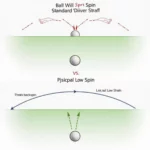Golf is often described in paradoxical terms. On the one hand, it’s a leisurely sport, a chance to unwind, connect with friends, and appreciate nature. On the other hand, it’s one of the most challenging sports, demanding precision, concentration, and an ever-evolving skill set. Today, we’re going to peel back the layers of this engaging enigma and explore what golf truly represents. Get ready for an educational, down-to-earth examination of the sport we all know and love!
What Is Golf?
At its core, golf is a game played on a vast landscape featuring 18 holes (although some courses might offer 9) where players attempt to hit a ball into each hole using as few strokes as possible. The beauty of golf lies not only in its simplicity but also in its inherent complexity — this is where its paradoxical nature shines.
The Basics of Golf
- Objective: Hit the golf ball into a series of holes in the least number of strokes.
- Equipment: Clubs, balls, tees, and often some golf attire.
- Play Area: A golf course with various terrains, including fairways, roughs, and greens.
The Paradoxical Attributes of Golf
When you delve a bit deeper, the paradox of golf reveals itself through several key characteristics:
- Relaxation vs. Competition: Many people take up golf to relax and enjoy the outdoors. At the same time, it can become highly competitive, with players striving to lower their handicaps and excel in tournaments.
- Inclusivity vs. Exclusivity: Golf is often viewed as a game for the elite, yet it has become increasingly inclusive, with programs designed to engage diverse populations, youth, and beginners.
- Tradition vs. Innovation: Golf honors a rich history, complete with rituals and etiquette. However, the sport continually embraces technological innovations ranging from advanced club designs to data analytics in scoring and performance.
- Individual vs. Team Sport: Although golf is primarily played as an individual endeavor, team formats like Ryder Cup and various charity tournaments illustrate its communal aspect.
 Scenic view of a golf course
Scenic view of a golf course
The Mental Game of Golf
One of the hallmarks of golf is its heavy reliance on mental fortitude. The psychological challenges of the game can be a double-edged sword—one day you might feel on top of the world, while another, even the simplest putt could haunt you. Here’s how the mental game plays into the paradox:
- Focus: Maintaining concentration in a sport that demands precision over several hours can be taxing.
- Emotion: The highs and lows of golf can trigger strong emotional responses, creating a unique psychological experience.
- Patience: Learning to accept setbacks and keep a level head is crucial for both newcomers and veterans.
The Physical Demands of Golf
While it might seem like a leisurely pursuit, golf requires physical preparation:
- Flexibility: A good golf swing enhances from flexibility, helping players maintain a consistent form.
- Strength: Core strength plays a vital role in generating power through the swing.
- Stamina: Walking an 18-hole course can accumulate several miles, making stamina a hidden asset.
 Golfer in mid-swing
Golfer in mid-swing
Tips for Enjoying Golf
Whether you’re a seasoned pro or an excited beginner, these tips can help you appreciate the complexities of golf:
- Practice Regularly: Like any sport, practice is key. Focus on different elements, such as driving, putting, and chipping.
- Watch and Learn: Observing professionals can provide insight into strategy, swing mechanics, and course management.
- Join a Community: Engaging with fellow players can enhance your experience. Consider joining a club or a local golf group.
- Keep it Fun: Remember why you started! Enjoy the camaraderie, the laughter, and the landscapes.
The Enhanced Experience of Golf
In recent years, golf has adapted to modern needs, making it more enjoyable for players of all ages and skill levels:
- Technology: GPS devices, swing analyzers, and smartphone apps can help improve your game.
- Courses: Many courses offer shorter options (like 9-hole layouts or executive courses) that cater to newcomers.
- Fitness: Many players incorporate fitness regimens to improve their game, bolstering strength and flexibility.
 Golfers using technology on the course
Golfers using technology on the course
Key Takeaways
- Golf is a paradoxical sport that combines leisure and competition.
- It holds contradictory qualities: inclusivity vs. exclusivity, tradition vs. innovation, and individual experiences vs. team interaction.
- Mental and physical demands are intertwined; the best players master both facets.
- Regular practice, engaging in community, and leveraging technology can enrich the golfing experience.
Frequently Asked Questions (FAQ)
-
Is golf easy to learn?
- Golf can be easy to start, but mastering the game requires practice and patience.
-
What should I wear to play golf?
- Typically, golf attire includes a collared shirt, golf pants or shorts, and appropriate shoes. Check course regulations as well.
-
How can I improve my golf swing?
- Focus on fundamentals, practice regularly, and consider lessons from a golf pro.
-
What’s the average score for a beginner?
- Beginners can expect scores over 100, but improvement comes with consistent play and practice.
-
Do I need to purchase my own clubs?
- While having personal clubs is beneficial, many courses offer rentals for beginners.
-
What are some key golf rules?
- Familiarize yourself with basic rules such as playing the ball as it lies and understanding penalties.
-
How do I find a local golf course?
- Websites like GolfNow or Google Maps can help locate nearby courses.
-
What’s the best way to enjoy golfing alone?
- Consider hitting the course when it’s less crowded, and focus on personal growth rather than competition.
-
Are there beginner-friendly golf courses?
- Yes! Many courses have specific tees designed for beginners. Look out for these options when planning your game.
-
Can I bring a friend who doesn’t play golf?
- Absolutely! Many enjoy accompanying friends or family members on the course, even without playing.
Dive into golf, embrace its paradoxes, and find joy in its challenges. Whether seeking relaxation, camaraderie, or competition, golf has something for every player. Get out there, swing away, and enjoy this timeless sport.

